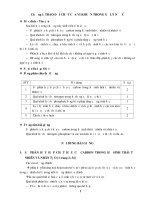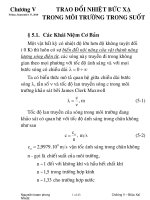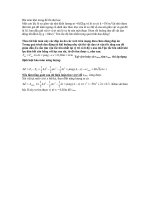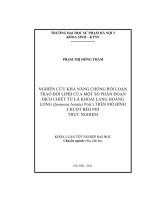- Trang chủ >>
- Sư phạm >>
- Sư phạm mầm non
Video trao đổi chéo của NST trong phân bào giảm phân
Bạn đang xem bản rút gọn của tài liệu. Xem và tải ngay bản đầy đủ của tài liệu tại đây (1.66 MB, 12 trang )
<span class='text_page_counter'>(1)</span><div class='page_container' data-page=1></div>
<span class='text_page_counter'>(2)</span><div class='page_container' data-page=2></div>
<span class='text_page_counter'>(3)</span><div class='page_container' data-page=3>
<i>UNIT 8: Life in the future</i>
<i>UNIT 8: Life in the future</i>
LANGUAGE FOCUS
</div>
<span class='text_page_counter'>(4)</span><div class='page_container' data-page=4>
<b>Full forms</b> <b>Contracted </b>
<b>forms</b> <b>Full forms</b> <b>Contracted forms</b>
I have
You have
She has
He has
It has
I’ve
You’ve
She’s
He’s
It’s
I have not
You have not
She has not
He has not
It has not
I haven’t
You haven’t
She hasn’t
He hasn’t
It hasn’t
Read the following phrases. Pay attention to how the
full and contracted forms of the auxiliaries are
</div>
<span class='text_page_counter'>(5)</span><div class='page_container' data-page=5>
• I’ve got something for you.
• You’ve got something for me?
• We’ve failed and they’ve passed
• Haven’t you? You’ve not been here long, of
course.
• I haven’t. but I’ve grown to love it already
• He’s left, and she’s gone to work, too.
• Hasn’t the doctor come yet?
</div>
<span class='text_page_counter'>(6)</span><div class='page_container' data-page=6>
Choosing the appropriate prepositions.
1. Luckily, you are /ON time for the meeting.
2. Many people are dying /BY various types of cancer.
3. I will not be here next week. I am going to be /IN business in
Mexico.
4. /IN the end of the book, they get married and live happily ever
after
5. Thank you for everything you’ve done. You are a true friend OF/
me.
6. I can’t believe /TO you. You always let me down
7. I have warned you ON/ the difficulties you have to face
when applying for the job.
8. Britney Spears is famous BY/ her beautiful face and sweet
voice.
9. The bookshop is AMONG/ the chemist’s and the
butcher’s and ACROSS/ the library.
10.Next year, I’m going to get married /WITH John and we are
going to move to Bristol.
</div>
<span class='text_page_counter'>(7)</span><div class='page_container' data-page=7>
<b>PREPOSITIONS</b>
<b>1</b> <b>On time: go to class on time</b>
<b> go to work on time</b>
<b> In time: come home in time to have dinner/to watch a TV program</b>
<b>2. To die of a disease/hunger/thirst</b>
<b> To die for the country/ the children</b>
<b> To die in: die in a car crash, die in an accident</b>
<b>3. To be on business/ to go on business</b>
<b>4. To believe in sth/sb</b>
<b>5. To warn sb about/against sth</b>
<b> To warn sb of sth</b>
<b>6. To be famous for sth</b>
<b>7. To get married to sb: </b>
<b>8. In the end = finally</b>
</div>
<span class='text_page_counter'>(8)</span><div class='page_container' data-page=8>
<i><b>The Article</b></i>
1. The indefinite article:
USAGE:
•
A: used before words that begin with a consonant.An: used before words begin with a vowel.
•used with professions;
eg: I’m a teacher
He’s an architect
• with some expressions of quantity:
Eg: a pair of (shoes)
a hundred, a thousand, a little, a few
• in exclamations with What + a countable noun
Eg: What a lovely day!
</div>
<span class='text_page_counter'>(9)</span><div class='page_container' data-page=9>
<i><b>The Article</b></i>
2. The Definite Article:
• before the title of seas, rivers, hotels, pubs,
theatres, museums, newspapers and
musical instrument.
Eg: The Atlantic The British Museum
• If there is only one
Eg: The sun The earth The Queen
• With superlative adjectives
</div>
<span class='text_page_counter'>(10)</span><div class='page_container' data-page=10>
<i><b>The Article</b></i>
3. No article:
There is no article:
•
Before plural and uncountable nouns when talking
about things in general
Eg: Milk is good for you.
•
Before countries, towns, streets, languages,
magazines, meals, airports, stations and mountains
Eg: I had lunch with John yesterday.
•
<sub>Before some places, with some forms of transport and </sub>
some time expressions:
</div>
<span class='text_page_counter'>(11)</span><div class='page_container' data-page=11>
EXERCISE 2:
<i>Put a/an, the, Ø in each space to complete the </i>
<i>following sentences.</i>
1. We went by ……train to the west of England.
2. …….people who live in…… Scotland are
called……… Scots.
3. ………Columbus was one of ……first people to
cross….. …Atlantic.
4. Davis learned to play…….violin when he was at
…..university.
the
the
</div>
<span class='text_page_counter'>(12)</span><div class='page_container' data-page=12>
EXERCISE 2:
6. Is that …..present Bill gave you for
…….Christmas?
7. …...computer has already
changed………..our life drammatically.
8. There was ….. accident yesterday at
…….corner of ……street.
9. I need …….time to think about…….offer
you gave me.
10. ……….little knowledge is ……dangerous
</div>
<!--links-->









